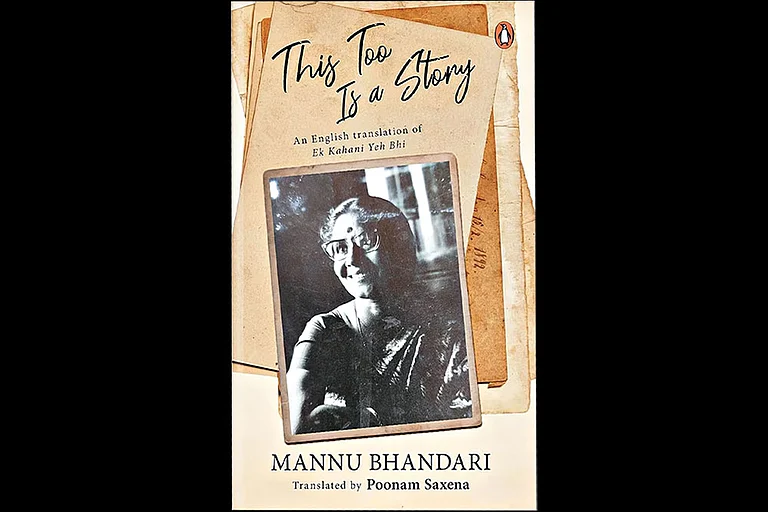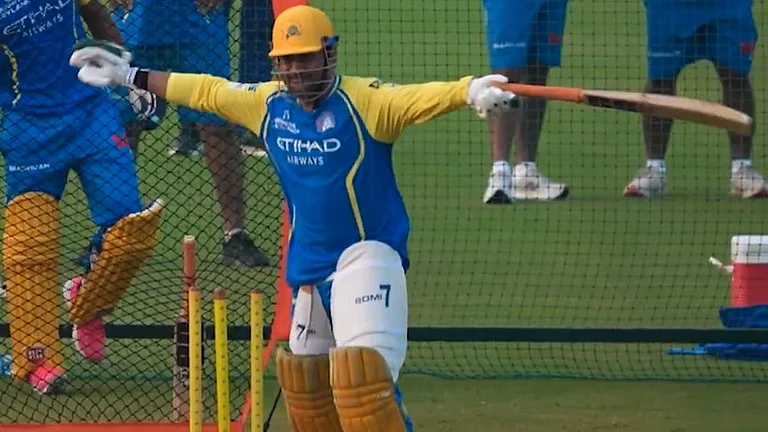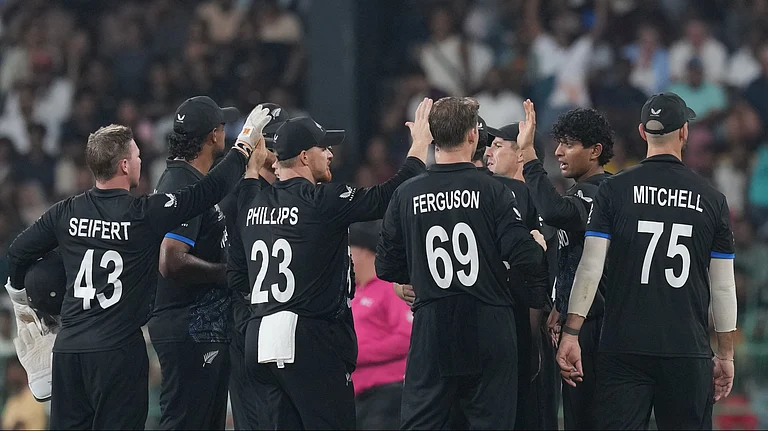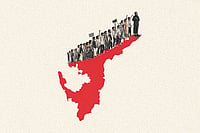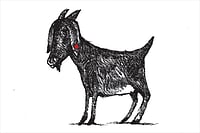“The opponents of the novel may certainly be entitled to its critique, as the proponents of the novel are entitled to applaud it. But shutting down life of the town, holding it to ransom and effecting threats to the author is not the way.”
—From the judgement delivered by the Madras high court in the ‘Mathorupagan’ case on July 5, 2016.
A very violent attack on Salman Rushdie—the writer who has been living a life of turmoil, with no peace of mind, for the last 30 years, going into hiding, being a refugee and experiencing displacement—has taken place now. The targeted threat to his life has been kept alive even after all these years, with the spirit of revenge not having decreased even a little. Near New York, in the midst of an audience of thousands of people at a literary event, a young man entered the venue and stabbed the writer with a knife. They say that he was stabbed in 10 places. Though his life is not in danger, it is not clear if it will be possible for 75-year-old Rushdie to get back to living a normal life as he did earlier.
That by attacking and destroying a person and removing him from the public space would also bring an end to his ideas is an ancient belief; a strategy. Ideas do not emerge from a vacuum. They cannot be voiced through oracles. Ideas leap and spread from one person to another. But the strength of the spread of ideas can be reduced; the speed of the spread can be slowed down; their borders can be shrivelled. All fundamentalist theories have clearly fathomed that it is possible to achieve these ends by eliminating an individual from the public space. Religiosity and casteism strongly affirm this.
Much has already been said about freedom of thought and ideas while discussing Rushdie and his writing. How are we to face this attack on him? What would be its effects globally? How will writers mould themselves in the future? Will they be able to create their works without fear? Will the percentage of self-censorship go up? These are questions to be pondered upon.
Even before we look for answers to those questions, the problem of whether we can register our condemnation of the assault on Rushdie has turned out to be a very important one. Some writers who condemned the act are facing threats. J.K. Rowling, who protested against it, has received a threat from somebody saying, ‘You are next.’ Sri Lankan author Jeffrey Hasan, who expressed his feelings against the attack, is also facing adverse reactions. At the same time, all the voices that had spoken loudly in favour of the freedom of expressing one’s ideas seem to be silent in the case of Rushdie.
Today, right-wing thinking has become stronger in the global political arena. Many political leaders are either its supporters or in a position where they have to accept it.

Present-day politics centres around these ideas, working for or against them. So, before a voice of protest is raised, the number of political controversies it might lead to looms before our eyes. Relations with countries may suffer; the opposition of internal groups may have to be countered. The greatest strength of democracy is the vote; but it is also its main weakness. The decisions of political parties are based on the vote banks that may be available.
ALSO READ: Salman Rushdie And The Iran Fatwa
There does not seem to be much of a stir among literary organisations and writers. Apart from news of the attack on Rushdie, one cannot see any Tamil article that presents views about the attack. There seems to be no evidence of any detailed views expressed either in English or in other Indian languages. Are we bypassing the attack on Rushdie as an ordinary accident that happened in some place, somewhere? Is it because we are weary after discussing Rushdie for more than thirty years? Was there an underlying expectation in the public sphere that something like this could happen at any time? The reason behind the silence of intellectual circles is incomprehensible.
The voices that rise in a frenzy when majoritarian forces act against the freedom of ideas have now become mute. No protests, even minor ones, condemning the attack! No public meetings! No flyers or posters! What could the reason be? Concern for minorities gets associated with such religious attacks. It is, of course, necessary to be cautious about criticising something that could go against the welfare of minorities. But it is not fair to be silent for the reason that speaking out might hurt the consciousness of minorities.
There is a great difference between people commonly having, as part of their everyday lives, particular religions and gods and the activities of communalists. The faith and emotions of people who believe in religion and follow the cultural codes associated with particular religions are taken advantage of and exploited by extremists. Communalism never functions for the welfare of the public; it follows its selfish agenda. Therefore, by making allowances to appease some people, we should never abstain from censuring the actions of fundamentalists. Under such circumstances, silence will not win people over. Even a single word will be sufficient; it will leap straight into their minds.
All religions adopt a one-way track. Their capital is faith. They do not tolerate any criticism of their codes. They never allow questioning. They use god to strengthen their authority. Communalism is very keen to institutionalise religion. This institution of religion never allows the prescribed codes and ideals to be critically questioned. It sees anyone who questions it as its enemy. It then exposes its villainous face of authority. It does not also hesitate to take the support of communalism.
Religion enters the arena with warnings and threats. In most circumstances, this alone seems to be adequate. When necessary, it kindles the frenzy of religion and promotes protests. The goal of such hardcore religion lies in being intolerant of any analysis of any of its ideals and in finally destroying the ideals themselves. If it is a film, prevent its screening; if it is a book, ban it. The next step that religion embarks upon is to destroy those connected with the suggestion of analysing ideas. To achieve all this, it is able to take advantage of people’s commitment to following their religion.
One might be able to accept great demonstrations, protests, the consigning of books to flames, as democratic methods of expressing opposition. Seeking judicial support could be welcomed. But religious fundamentalism does not like to approach courts of justice. It knows that by and large, laws might not be in its favour. That is why it compels governments to bring stays and prohibit everything it finds unpalatable. It seeks to annihilate those who have opposing views. All the fundamental qualities like divinity, love and compassion that religion teaches disappear before fundamentalism.

How are writers to write against these attacks, offer words of support, when circumstances are such that their lives are at stake? One can have control over one’s writing, but that is possible only to a certain extent. If you start the censoring process, you will not be able to write even a single line. Every line you have written would pose problems. Writing is something that has qualities contrary to the nature of religion. Writing will have critical opinions about everything. It will ask all values to be questioned. It will explain the inadequacies of those values. Discarding the single approach, it will look at them from different angles. It will always take the side of the victim. Under such conditions, self-censorship plays a very limited role. Particularly in the flow of writing, self-censorship will run and hide.
Writing has the power to take a society forward. It is the written word that takes the initiative to register any change. It not only recognises change, but also takes it forward to the next stage. There are many styles of writing. I feel it is better to resort to other forms of expression than to directly write about an issue. But this is an age that does not like fictionalised facts. The present belongs to a generation that likes everything to be overt. We may have to find new avenues of presenting facts with varied forms of imagined constructions.
The person who attacked Salman Rushdie was a young man of 24 years. He cannot have had sufficient knowledge of literature or the ability to understand literature. Would he have read any of Salman Rushdie’s books? Would he have at least read The Satanic Verses? Even if he had, was he capable of assimilating the book’s purport? All countries must encourage the learning and appreciation of literary works, both at the school and at higher-education levels. It is essential to have an educational system that fosters respect for literature and writers. The Madras high court that awarded the judgment in the Mathorupagan issue offered a recommendation.
Government authorities and police officials do not have any understanding of literature or the arts. They handle issues relating to these only from the angle of maintaining law and order. They must realise that these are problems related to the freedom to have and hold personal ideas and opinions. To ensure this, the government must continuously organise programmes that enhance one’s ability to appreciate art. That was the court’s recommendation. Nor stopping with officials, this trend could be introduced in general education as well. The heart that has tasted the delights of the arts will never indulge in violence. Society should move from laying stress on moral codes in its curriculum for students to one that trains them to appreciate the arts and literature.
In the present circumstances, it seems like one could even accept a ban on a book. It is clear that in these times of the proliferation of media platforms, nothing can be permanently banned. The era of printing is coming to an end. And yet, the fear of seeing something in print has not gone. The fear of social media is not as high as the fear of printed matter. So I am compelled to think that each writer can declare that if you do not like some work, prohibit it in all areas under your control. What else can one do in the face of flaming communalism? The attack on Rushdie pushes me towards accepting a ban on a book. The world should allow one to live fully the years one has been allotted to live. Life is grander than everything else. Life is sweet. ‘Life breath! Who knows your grandeur? You are the manifest, visible Divine!’ says the great poet Bharathi. Yes, philosophical treatises abound that say the life-giving breath is god and the physical body is its temple. No one has the right to destroy the god that is life.
‘I may not agree with your idea. But I’ll give up my life to fight for your right to express it.’ Voltaire’s words stay alive for all time. Here, giving up one’s life implies fighting to the end to claim your right to put forth counter arguments. It’s not necessary to give your life for the cause.
The concept of laying down one’s life is a very ancient one. That was the age when engaging in wars and dying in the course of fighting was considered chivalrous. The times that celebrated war have ended. Today’s cultural society has arrived at the point that says there should be no wars at all. We say that the death penalty is barbaric. Many countries have abolished death sentences. No man should die an unnatural death for any reason. No man should be permitted to take another man’s life, either.
My wish for Salman Rushdie is that he will get well and live to be hundred. I register my strong condemnation of the violent attack on him.
(This appeared in the print edition as "May Rushdie Live to be Hundred")
(Translated from Tamil by Padma Narayanan)
(Views expressed are personal)
Perumal Murugan is a Tamil author, scholar & literary chronicler








